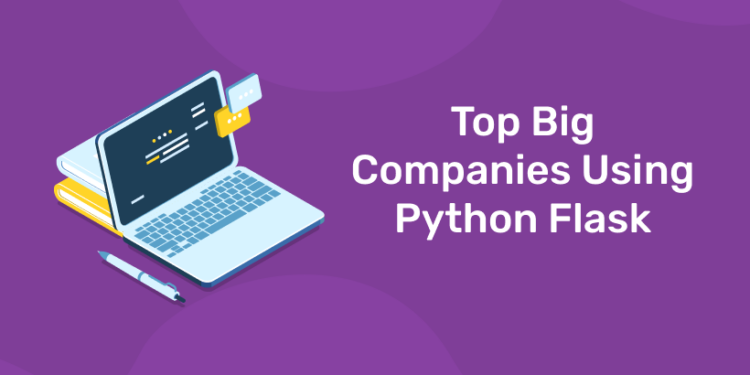Table of Contents
Python Flask is a lightweight web framework used by top-tier companies globally. It enables rapid web application development. Big industry players like Netflix and Reddit incorporate Flask in their backend infrastructure. Lyft and LinkedIn also utilize Flask for specific functionalities within their systems. Pinterest and Twilio leverage Flask for rapid prototyping and API development. Uber and Mozilla have reportedly integrated Flask for specific services within their tech stacks. These companies harness Flask’s simplicity and flexibility for various backend tasks and web services. In this article we will discuss in detail on ‘Top Big Companies Using Python Flask’.
What is Python Flask?
Python Flask is a lightweight and flexible web framework used for building web applications in Python. It’s known for its simplicity, minimalism, and ease of use, making it a popular choice among developers. Flask is categorized as a micro-framework, allowing developers to create web applications quickly and efficiently. It provides tools, libraries, and functionalities to handle web development tasks such as routing, request handling, template rendering, and more. Flask is extensible, meaning developers can add or remove features as needed, making it versatile for a wide range of web development projects.
Grab the opportunity to learn Python with Industry Experts! Get a free Demo Here!
Why Choose Python Flask?
1: Which of the following data types is immutable in Python?
Choosing Python Flask for web development offers several benefits:
Simplicity and Ease of Learning:
Flask has a straightforward and intuitive syntax, making it easy for beginners to grasp and start building web applications quickly. Its simplicity allows for rapid development.
Flexibility and Customization:
As a micro-framework, Flask provides a lightweight structure and allows developers to choose specific components they need. It offers flexibility, enabling customization based on project requirements.
Versatility:
Flask is versatile, suitable for developing various types of web applications, from small-scale projects to larger, more complex applications. It accommodates different use cases and scales effectively.
Rich Ecosystem:
Despite its lightweight nature, Flask has a robust ecosystem with numerous extensions and libraries available. These extensions enhance Flask’s capabilities, providing solutions for authentication, database integration, and more.
Community Support:
Flask has a large and active community of developers. This community contributes to extensive documentation, tutorials, and support forums, making it easier for developers to find solutions and learn from others’ experiences.
Suitability for Prototyping:
Flask is well-suited for prototyping and developing minimum viable products (MVPs) due to its simplicity and rapid development features. It allows developers to build functional prototypes efficiently.
Integration with other technologies:
Flask seamlessly integrates with other Python libraries and frameworks, enabling developers to combine its functionalities with other tools and technologies, enhancing its capabilities.
Grab the opportunity to learn Python with Industry Experts! Get a free Demo Here!
Top Big Companies Using Python Flask
Python Flask, a micro web framework, has gained popularity for its simplicity, flexibility, and ease of use. While information about companies exact technology stacks might not always be publicly available, several notable companies have utilized Flask in their systems:
1. Netflix:
Known for its use of microservices, Netflix has incorporated Python Flask into parts of its infrastructure, employing it for specific API services and backend functionalities.
2. Reddit:
As one of the largest social news aggregation platforms, Reddit has reportedly used Flask for certain components of its platform, especially in backend services.
3. Lyft:
The ride-sharing company Lyft has utilized Flask in its backend systems to power specific functionalities of its platform, leveraging its lightweight and extensible nature.
4. LinkedIn:
Although primarily using Java for its backend, LinkedIn has incorporated Flask for certain web applications or services within its infrastructure due to its rapid development capabilities.
5. Pinterest:
Flask has been part of Pinterest’s tech stack, especially for specific services or tools, allowing for quick prototyping and development of certain features.
6. Twilio:
This cloud communications platform has used Flask in some parts of its system, taking advantage of its simplicity to build APIs and web services.
7. Uber:
While primarily known for using Node.js and Go, Uber has reportedly employed Flask in some services, benefiting from its ease of use for specific backend tasks.
8. Mozilla:
Flask has been used by Mozilla in various projects, allowing the organization to quickly create prototypes, APIs, and web applications for internal tools or experimental projects.
9. Dropbox:
Flask has been utilized in parts of Dropbox’s infrastructure, potentially for internal tools or specific services, taking advantage of Flask’s lightweight structure.
10. Yelp:
Known for its reviews and user recommendations platform, Yelp has reportedly used Flask for certain services or tools, possibly for internal development or experimental projects.
Conclusion
Python Flask, a lightweight web framework, has gained traction among top companies for its versatility and ease of use. Several notable industry players like Netflix, Reddit, and Lyft incorporate Flask in their backend systems for various functionalities. Companies such as LinkedIn, Pinterest, and Uber have also integrated Flask into their technology stacks, utilizing its flexibility for specific services or tools. The adoption of Flask by these big companies underscores its adaptability and effectiveness in handling diverse web development needs. Overall, the utilization of Python Flask by prominent companies highlights its value as a reliable framework for developing scalable and efficient web applications in different sectors.
Top Big Companies Using Python Flask: FAQs?
1. What is Python Flask?
- Python Flask is a lightweight web framework used for building web applications in Python. It’s known for its simplicity, flexibility, and ease of use.
2. Which big companies use Python Flask?
- Several prominent companies leverage Python Flask in their technology stacks, including Netflix, Reddit, Lyft, LinkedIn, Pinterest, Uber, and more, for specific backend services or functionalities.
3. Why do companies choose Python Flask?
- Companies choose Python Flask due to its simplicity, flexibility, and versatility. Flask’s minimalistic design, ease of learning, and customizable nature make it suitable for various web development tasks.
4. How does Python Flask benefit these companies?
- Python Flask benefits big companies by enabling rapid development, scalability, and ease of integration. Its lightweight structure allows for quick prototyping, while its extensibility facilitates the addition of functionalities.
5. What are some use cases of Python Flask in these companies?
- Flask is used by these companies for diverse purposes such as API development, backend services, rapid prototyping, specific web applications, and handling certain functionalities within their tech infrastructure.
6. Is Flask suitable for large-scale applications?
- While Flask is lightweight, its use in big companies like Netflix and Reddit suggests that it can be part of scalable architectures when combined with appropriate strategies and tools.
7. How does Flask compare to other frameworks?
- Compared to more comprehensive frameworks, Flask is minimalistic and offers greater flexibility. It allows developers to choose components as needed, making it suitable for certain use cases.
|
Explore These In-Demand Courses |
||











